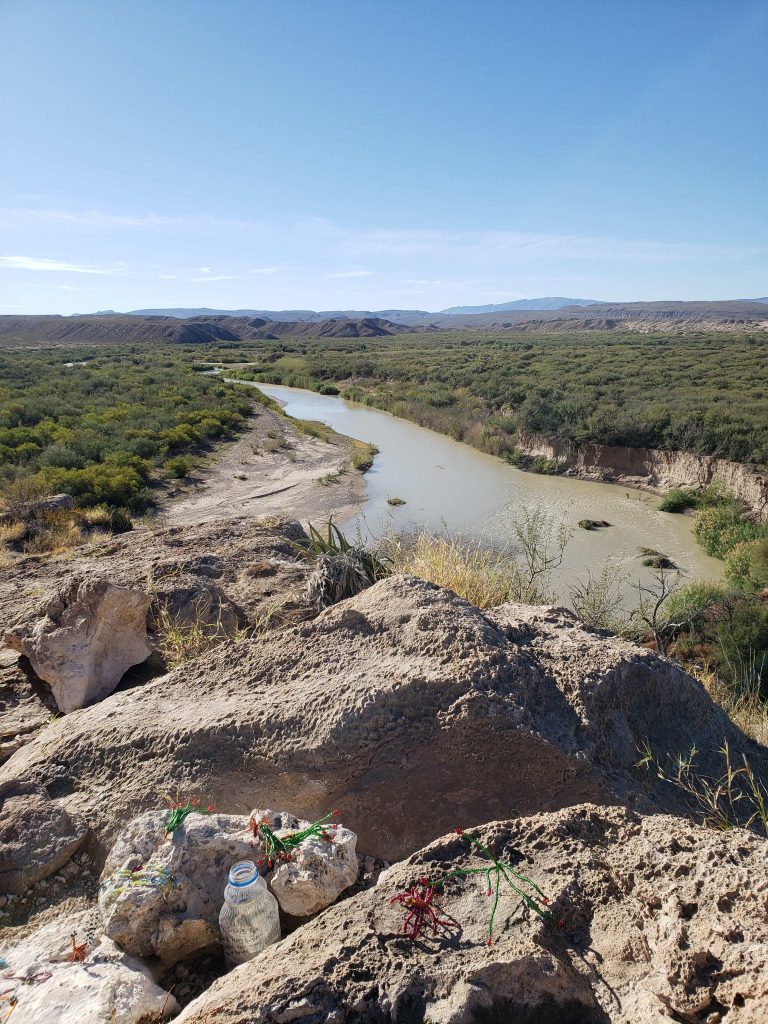The Rio Grande river forms the southwest border of Texas. About midway along this border the river makes a big S curve. This is the big bend and it is here that Big Bend National is located. The park is defined by the Chisos Mountains in the center, Santa Elana Canyon to the west and Boquillas (bo-key-yas) Canyon to the east. Boquillas canyon is where the Rio Grande cuts through a massive rock uplift called Madera del Carmen and the canyon’s proper name is Boquillas del Carmen, in English the Lips of Carmen. The small Mexican village about 4 miles from the mouth of the canyon is also named Boquillas del Carmen. Both are referred to simply as Boquillas.
The trail to Boquillas Canyon in Big Bend is only a mile long but one must go over a large rock outcrop to reach the Rio Grande river plain and the entrance to the canyon. There is no other way in. The canyon’s 1,000 foot vertical walls prevent access anywhere else. The last time I tried the temperature was 100. With no shade from the desert sun on the rock outcrop I did not make it. Today it is 65 degrees and, although the sun makes it feel warmer, it should be an easy hike.
The canyon’s 1,000 foot vertical walls prevent access anywhere else. The last time I tried the temperature was 100. With no shade from the desert sun on the rock outcrop I did not make it. Today it is 65 degrees and, although the sun makes it feel warmer, it should be an easy hike.

The top of the rock outcrop, if one steps off the trail and goes to very promontory of the rock, there is a splendid view of the Rio Grande. A few miles up river the buildings of the Mexican village of Boquillas glimmer in the desert sunlight and at my feet the figurines made of twisted copper wire glisten. A plastic bottle is tucked in the rocks. “art and craft, made to by books for Boquillas school, $10”. Maybe it’s for the school and maybe not. Boquillas derives much of its livelihood from tourist from Big Bend National Park. The U. S. has a border crossing across from Boquillas. Open eight hours a day, five days week it allows Park visitors to legally travel to and from Boquillas. Slightly less legal is a tradition for Boquillas’ children and some adults to make crafts and place them along the park’s trails with a donation bottle in hope Americans will buy them. I put a dollar in the bottle and begin trekking down the far side of the rock outcrop. The sun is beginning to make it feel hotter.
Reaching the bottom one steps from high desert to a lush river bank with trees, tall grasses and reeds. They provide refreshing protection from the sun. The ground is level the walking easy. I’ll go on a bit further. I’m almost there anyway as I look up at the giant walls.
Looking back down at the trail I see a man in a cowboy hat. Not on the trail but close to the river bank. And then song echoes off the canyon walls …
“Yo soy ranchero,
En mi rancho yo vivo”
As I approach he sees my camera.
“For you my friend I let you take picture.”
“You want to buy? Walking stick. Necklace.” He says pointing to the items laid out on a blanket on the sand.
“No señor, I don’t need any more things but your song is muy bueno (very good). Here is five dollars for your song.”
He smiles and puts it in his pocket.
“My name is Alan.” extending my hand.
“Jesús. Me llamo Jesús.” (My name is Jesús (hey-soos))
“You come here from Boquillas?”
“Si, five miles y five miles back to mi casa. (my house) Each dia. (day)”
“You’ll be back mañana? (tomorrow)”
“Si, pero mañana es frio. (Yes, but tomorrow is cold) I come if not wind. If wind not come.” He points to the river he must cross. “Wind. No good. You back mañana?”
“If I can. Si. I’ll come back.”
“You have bars? Nut bars? Trail mix?”
“No. No I don’t have anything with me not even water.”
“Mañana you bring? Por los niños. (For the children) I have many children.”
“I’ll try to come back. Who knows what tomorrow brings.”
“Es Navidad. Por los niños Navidad.” (It’s Christmas. For the chidren’s Christmas.)
“I’ll see what I can do.”
“The parking. No Ranger?”
“No.”
“Border Patrol?”
“No. But yesterday they were further up the road.”
“The picture. No show Ranger. The Ranger no like me aqui. (here)”
“No, I won’t show the Ranger.”
“Bueno.”
“I have to get back. My wife is waiting.”
“Si. You come mañana.”
“Si. If I can.”
“Adios amigo.”
“Adios.”
That evening the wind picks up. By dawn the following day it’s gusting to 40 mph. Jesús won’t be crossing the river today.
Lost the comment I just sent! Do enjoy your blogs and envy your adventures. Back in Sydney for the holidays, and to Kiama again, 5/1. Travel safely, love, Robin.